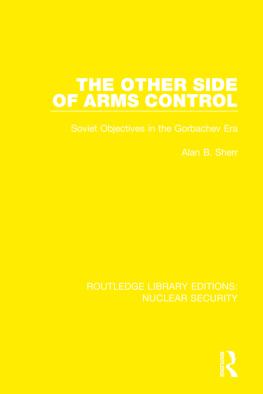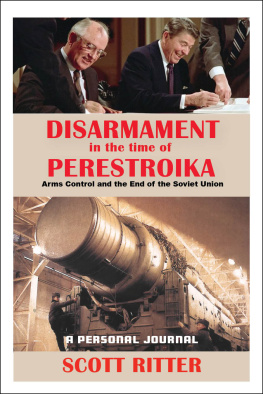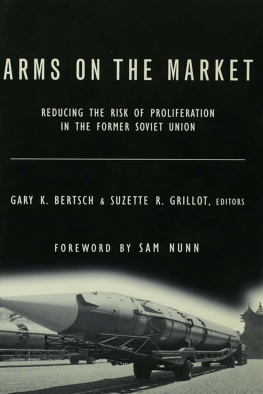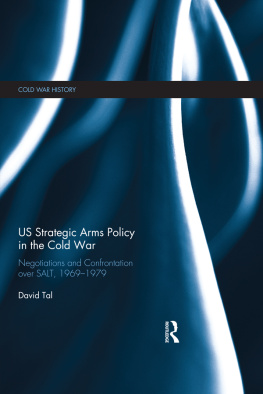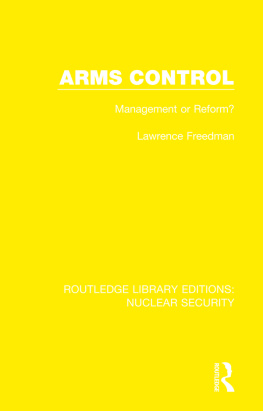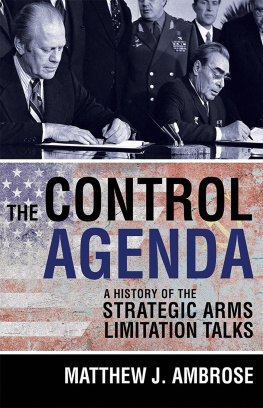ROUTLEDGE LIBRARY EDITIONS: NUCLEAR SECURITY
Volume 31
THE OTHER SIDE OF ARMS CONTROL
First published in 1988 by Unwin Hyman
This edition first published in 2021
by Routledge
2 Park Square, Milton Park, Abingdon, Oxon OX14 4RN
and by Routledge
52 Vanderbilt Avenue, New York, NY 10017
Routledge is an imprint of the Taylor & Francis Group, an informa business
1988 by Unwin Hyman, Inc.
All rights reserved. No part of this book may be reprinted or reproduced or utilised in any form or by any electronic, mechanical, or other means, now known or hereafter invented, including photocopying and recording, or in any information storage or retrieval system, without permission in writing from the publishers.
Trademark notice: Product or corporate names may be trademarks or registered trademarks, and are used only for identification and explanation without intent to infringe.
British Library Cataloguing in Publication Data
A catalogue record for this book is available from the British Library
ISBN: 978-0-367-50682-7 (Set)
ISBN: 978-1-00-309763-1 (Set) (ebk)
ISBN: 978-0-367-53700-5 (Volume 31) (hbk)
ISBN: 978-1-00-308294-1 (Volume 31) (ebk)
Publishers Note
The publisher has gone to great lengths to ensure the quality of this reprint but points out that some imperfections in the original copies may be apparent.
Disclaimer
The publisher has made every effort to trace copyright holders and would welcome correspondence from those they have been unable to trace.
THE OTHER SIDE OF ARMS CONTROL
Soviet Objectives in the Gorbachev Era
Alan B. Sherr
Copyright 1988 by Unwin Hyman, Inc.
All rights reserved.
Unwin Hyman, Inc.
8 Winchester Place, Winchester, MA 01890, USA
Published by the Academic Division of
Unwin Hyman Ltd,
15/17 Broadwick Street, London W1V 1FP, UK
Allen & Unwin Australia Pty Ltd,
8 Napier Street, North Sydney, NSW 2060, Australia
Allen & Unwin (New Zealand) Ltd,
in association with the Port Nicholson Press Ltd,
60 Cambridge Terrace, Wellington, New Zealand
First published 1988
Library of Congress Cataloging-in-Publication Data
Sherr, Alan B.
The other side of arms control: Soviet objectives in
the Gorbachev era / Alan Sherr.
p. cm.
Bibliography: p.
Includes index.
ISBN 0-04-445061-3. ISBN 0-04-445063-X (pbk.)
1. Nuclear arms controlSoviet Union. 2. Soviet
UnionForeign relations1975 3. Soviet UnionPolitics
and government1982 4. Soviet UnionEconomic
policy1981 5-Gorbachev, Mikhail Sergeevich, 1931
I. Title
JX1974.7.S464 1988 87-32938
327.47dcl9 CIP
British Library Cataloguing in Publication Data
Sherr, Alan
The other side of arms control: Soviet objectives in
the Gorbachev era.
1. Nuclear weaponsGovernment policySoviet Union
2. Soviet UnionMilitary policy
I. Title
355.033547 UA770
ISBN 0-04-445061-3
ISBN 0-04-445063-X Pbk
Set in 10 on 12 point Garamond and printed in Great Britain by Biddles of Guildford
Dedication
With love to Mary-Lou, Reuben, Micah, and Jonas, for giving me the best of reasons to write such a book, and to Simon, Charlotte, Janet, and David for giving me the foundation.
Acknowledgements
I had the good fortune to be a research fellow at the Center for Science and International Affairs at Harvard University while writing this book. There are few places that are so conducive to productivity and scholarship. I owe special debts of gratitude to Paul Doty, former director of CSIA, and to Joseph Nye, director, for their support and encouragement.
Many of my colleagues at CSIA gave generously of their time in reading drafts and providing feedback. Kurt Campbell was especially helpful in steering me in sensible directions; and Abram Chayes and Antonia Handler Chayes told me when they thought I was making progress and when I was about to fall over a cliff. Beyond being valued colleagues, they are all good friends who made the going a great deal easier, if not altogether smooth.
John Rhinelander provided invaluable help by looking closely at several chapters and provided detailed criticisms. Eric Stubbs and Stephen Flanagan also gave me detailed comments for which I am most grateful. I appreciate as well the suggestions offered by Daniel Arbess and Mark Kramer, who read portions of the manuscript.
Because Gorbachev would not hold still, work on revising several chapters extended beyond my tenure at CSIA I am indebted to Mark Garrison, director of the Center for Foreign Policy Development at Brown University, both for his specific suggestions on ways to improve the manuscript and for his general support for my continuing work.
I would be negligent indeed if I failed to thank the many people I have known for the last eight years at the Lawyers Alliance for Nuclear Arms Control. It was through that group of dedicated individuals that I became involved in nuclear arms issues and was introduced to the Soviet Union. In particular, Anthony Sager, Wayne Jaquith, and Hans Loeser shared with me the ups and downs of a nonprofit educational group, and taught me a great deal along the way.
Financial support for my research and writing was provided by the Center for Science and International Affairs, The Rockefeller Family and Associates, and the Ploughshares Fund. I thank these institutions, and Wade Greene and Sally Lilienthal, for their generosity and their confidence in my project.
Finally, thank you to my wife and children, and to my friends, who kept me on a more or less even keel, and even made sure I enjoyed myself.
In February 1987, Mikhail Gorbachev told an assembly of foreigners in the Kremlin:
You have arrived in the Soviet Union at a time when essentially revolutionary changes are under way here. They are of immense significance for our society, for socialism as a whole, and for the entire world. It is only by understanding their content, meaning and aims that one can form a correct opinion about our international policy. Before my people, before you and before the whole world, I state with full responsibility that our international policy is more than ever determined by domestic policy, by our interest in concentrating on constructive endeavors to improve our country. This is why we need lasting peace, predictability and constructiveness in international relations.
Even to a skeptical ear, there is a ring of truth to Gorbachevs declaration. Surely, the USSR is at a crossroads. The Soviet economy is stagnant, its system of government is inefficient, and much of the vitality of its society has been sapped by years of enforced conformity. No one can doubt that the Gorbachev leadership places the highest priority on clearing away the obstacles to domestic reform and moving dynamically into the twenty-first century.
In view of this priority, it is quite understandable that the Soviets would want to minimize foreign diversions to encourage peace, predictability, and constructiveness, in Gorbachevs words so that he and his colleagues can devote their energies to the challenges at home. It is also likely that the Soviet leadership perceives nuclear arms control to be a potentially important element in achieving this aim. But how should the nonsocialist world regard Gorbachevs peace overture? Is it a temporary attitude, arising not out of a lasting commitment to international stability but from the exigencies of the day? Should the capitalist nations cooperate in providing Gorbachev with the breathing room he needs or should they even go so far as to help in reconstructing the Soviet economy? Most important, can the Soviets be trusted to live up to nuclear arms agreements, or, after they no longer need to display a benign countenance, will they reveal a sinister face and renounce their nuclear arms control obligations?

